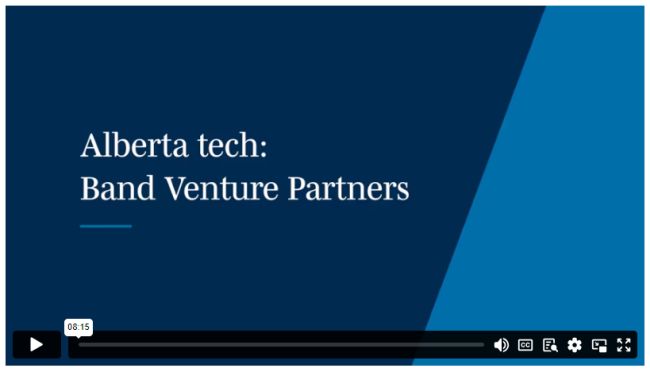Geoff Kelsall (00:09): Why does Band VC invest
in the kind of tech that you do and where does your investment
thesis come from?
Mike Mannix (00:16): We’re a corporate
venture as a service business, which is a first-to-market in
Canada. So, it’s a unique model that people may not be aware
of. What we ultimately do is run the corporate venture program for
companies looking to leverage venture as part of their broader
innovation program. So, generally speaking, our corporate
engagements direct our thematic or portfolio interest and
direction.
Geoff Kelsall (00:48): What do you find is most
exciting about the tech sector and VC in Alberta today?
Mike Mannix (00:54): We’ve got that
industrious culture here. I think we’ve got supportive
governance and government that wants to see industry grow.
We’ve just needed the impetus to really move beyond just the
energy space. We’ve had to mature as a population and as
we’ve grown just in scale, we’ve had immigration of
different talent sets and interest sets and all those kinds of
things.
And so, what was interesting when I moved back in 2016, the tech
ecosystem had really just turned on in Alberta. I’m not the
oldest, but I’ve been through a couple cycles. You talk to the
older folks; they’ve been through more cycles.
There’s always a “never again” mentality, and
“Oh, we’re going to diversify this time”. And, you
know, “We need better stability.” It was different this
time. You talk to all generations and the outlook for the energy
industry at that point in time was different than it had been in
the last 60 years. True industry veterans were of the opinion that
the true nature of the industry globally had changed, fundamentally
had changed, and we needed to do something different.
And so, there was this momentum behind looking for that
“something different”. And therein, the global digital
economy picking up and markets and regions around the world wanting
to develop their own tech ecosystems as a driver, Alberta was no
different in that front, but we’re incredibly fortunate with
what I kind of call “the godfathers of tech” in Alberta,
who, out of the I would say, the goodness of their hearts, and for
a vision for the future of the province and our future citizens,
they gelled that community and they really anchored that community.
They put values around that community, and they got mass and a
little bit of density. And they kickstarted it, right? And then you
were able to bring in some government support, then you were
bringing in some industry support, and then the capital started to
flow.
The innovators started to have more support in the ecosystem and
in the infrastructure. Things like CDL, etc. started to turn on.
What excites me the most about tech in Alberta is I just think
it’s naturally positioned to capitalize on some of those core
elements I was talking about earlier, the industrious nature of the
province.
We’ve got a huge growth and talent, great immigration, good
capital flows. Here you’re seeing the formation in the tech
ecosystem continue to pick up. We’re the fastest growing in the
country, quarter over quarter now. And so, there’s just that
that positive momentum. That excites me because it’s the
beginning of something. And don’t get me wrong, we’ve got a
long way to go, right? We are not Ontario yet, we are not BC yet,
we are not Québec yet, but we have the momentum. We’ve
got enough of a basis here. We have some solid founder champions
that are true community-minded folks like Hanif Joshighani, Symend
for example, that really want to pay it forward, give it back.
They’ll reinvest here, they’ll mentor here.
And that’s what we need, right? You need some of those
companies to hit. You need them to scale. You need them to anchor
the community. Benevity’s obviously a key anchor there.
There’s Solium’s etc. We can go on and on in the list, but
we’ve had enough wins now that we’re starting to get the
recycle. And it’s not just capital, it’s the talent,
right?
And that’s the really interesting thing is we’re getting
now density of qualified founders that have scale and that really
sustains the momentum.
Geoff Kelsall (04:29): So, when you look at
startups that you’re thinking about investing in, what
specifically do you look for as sort of your key markers of
what’s going to make a successful business?
Mike Mannix (04:41): You know, we’re
looking for scalable problems. We’re looking for those true
solution sets. But what our corporate domain experts tell us, and
we learn are the real problem sets. We want founders and teams that
are collaborative folks, everybody talks about being coachable. You
want a group that sees our capital, our team, our background and
expertise as additive to what they’re trying to do, right? And
so, we’re really looking for that kind of group.
And then there’s the traditional things. You know, obviously
we’re looking for the right valuation, financial outlooks at
negotiations, just the traditional items. I wouldn’t say
we’re any different than market in that respect. And so, when
we’re making these investments, we want to look for the teams,
the founders, that want the help.
That have that passion, that have that resilience, but want
somebody or a group or whatnot that they see as additive. Because
that’s what our business model is. We’re trying to make it
easier for founders to scale and we’re trying to help
corporates innovate and survive in the digital economy and speed up
that pace of change with their business so that they’re
sustainable. Right?
Geoff Kelsall (05:53) Right.
Mike Mannix (05:54): If you can work together
in that model, the amount of value that we can create, the new
businesses that we can scale and support, and the existing
incumbent businesses that we can sustain to me is incredibly
meaningful. So, I’d say the unique thing maybe that we would
really dig into is trying to understand that founder mindset, that
team, how they work.
You know, there’s particulars. I’m a bit of a neat
freak, data freak or not data freak, but detail freak. So, if
we’re in diligence and there’s a bunch of nitpicky stuff
that’s just consistently off, it’s alarm bells for me,
right? So, I think the founders that are watching this, when
you’re going into your data room or providing materials or
collaborating in the due diligence process.
I know it’s hard. I know you’re moving in a million
miles a minute, but try to make things as tight as you can because
where there’s smoke, there’s fire, right? And so, it’s
just something we’re going to dig into.
Mike Mannix (06:57): The most obvious, unique
one is that, again, we’re the only model in the country doing
this. I gave you a little bit of the rationale of why we’re
doing it part again. I just think Canada has such an incredible
opportunity ahead of it. We need to get out of our own way a little
bit. And, you know, we serve clients on both sides of the border.
We’ve got US and Canadian clients. And it’s just incredible
how much more aggressive and fast-paced, and risk-on Americans are.
And we need to compete with that, right.
And in this country, we need more entrepreneurship in that I
just implore any of your corporate customers, clients that are
listening to this, seriously consider how you are innovating. Take
a longer-term view, work with the startup companies because they
have the solutions to your problems. You just need the model to
work with them. And a little shameless plug here, if you’re
going to do that, put it in a corporate venture wrapper because you
create a ton of value by working with a startup.
Why wouldn’t you capture that value and recycle it back into
your R&D spend or whatever it is and recapture that margin?
The content of this article is intended to provide a general
guide to the subject matter. Specialist advice should be sought
about your specific circumstances.




